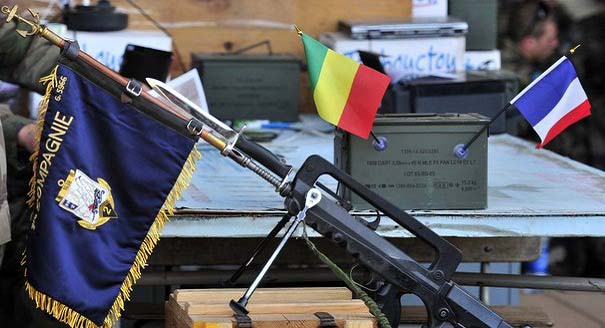In early 2012, the former French foreign minister, Alain Juppe, warned about Mali becoming a second Afghanistan. He called on the EU not to ignore this part of Sub-Saharan Africa.
Last November, the EU finally agreed to send up to 250 military advisors to help train Mali’s military. The hope was that with their help, the government could reconquer the north of the country now controlled by radical Islamist fighters.
Training missions are one of most important soft power instruments used by the EU to project influence.
The EU intended to launch the Mali mission later this year. But when the Islamists launched an attack on Mali’s government forces in early January, France was no longer prepared to wait. President Francois Hollande ordered fighter aircraft to bomb rebel targets this past week. He is still waiting for support from other EU countries.
Chancellor Angela Merkel has no intention of sending troops. Berlin will support the Mali mission with logistics and possibly medical aid.
The last thing Merkel wants are body bags returning home during her bid to become re-elected for a third term next September. So much for all the talk by the German foreign, defense, and development aid ministries that their goal is to prevent failing states from becoming failed states.
Italy is no position to help France, either, being in the throes of an election campaign. As for Spain, Prime Minister Mariano Rajoy has few euros to spend on military missions.
Britain is a different case. London and Paris have a close military relationship. Together, they pushed for the military operation against the late Colonel Muammar Gaddafi in 2011, despite reservations by many other European countries and the United States.
Many of the weapons and munitions now in the hands of the Islamists and Tuareg rebels originate from the thousands of foreign fighters that served Gaddafi.
An unnamed senior British official told the Financial Times this week “that French forces could be vulnerable to attacks from Islamist rebels in central Mali as they waited for African support.” But would that not be all the more reason for London to support Paris? No, it would seem.
Yet if Europeans believe that this is a distant conflict having nothing to do with Europe, they are wrong.
Mali and the Sahel matter to Europe’s security. The region is already a launching pad for radical Islamists (who, by the way, also destroy mosques and Muslim shrines), and a motley of criminal gangs taking advantage of a failing state.
Europe is not insulated, as Britain and France know from their experiences of terrorist attacks. Yet Europe’s response to the crisis in Mali proves once again that it has neither the political will nor the defense capabilities to react to Mali.
Staying with the Sahel, it is worth taking a look at the European Court of Auditors (ECA) report, published this week, on the efficacy of EU development aid. Development aid is another of the EU’s other soft-power tools.
The ECA report is called “The European Development Fund (EDF) contribution to a sustainable road network in sub-Saharan Africa.” In Africa, roads are essential for regional integration, economic growth, security, social development, and effective public administration. They are important for getting children to school, women to post-natal care, farmers to the markets. In these mostly landlocked countries, the use of roads account for over 80 percent of trade in goods and services. The railway network is almost non-existent.
Despite EU rhetoric about sustainability, this report makes grim reading. Nearly a third of the roads financed by the EU in the region are in very poor condition, despite huge sums invested in this infrastructure. Between 1995 and 2011, the EDF spent 7.4 billion euro on roads in Sub-Saharan Africa.
The report, which looked at over 40 projects in Benin, Burkina Faso, Cameroon, Chad, Tanzania, and Zambia, criticized that the Commission did not set clear conditions when allocating such funds. It also failed to monitor the maintenance of the roads once they were built. “Technical cooperation funded by the Commission has been less successful than could be expected,” the ECA stated.
The main reason for the rapid deterioration of the roads is vehicle overloading. The EU Commission, the report charges, does not give enough attention to the root causes, “such as illicit arrangements to share the market between road transport service providers, informal road controls and the lack of competitiveness of other transport modes, notably railways.”
The Court of Auditors does not ask questions about how the design of the roads; how the tenders were issued and how construction and materials were supervised.
The report makes no mention of transparency, accountability, or the issue of corruption. The recipient states are blamed for failing to implement institutional reforms that would ensure proper maintenance of the infrastructure.
If and when the EU does send its advisors to Mali, it will be interesting to see if the roads outside the capital Bamako are still intact. Mali has already received 419 million euro in road-sector funds from the EU.
What is the conclusion from all of this? Certainly, Europe has a lot of good will and a lot of money to deal with problems originating in the world outside its borders. But as the case of Mali shows, the EU’s use of soft power all too often lacks ambition, determination, and professionalism.






.jpg)